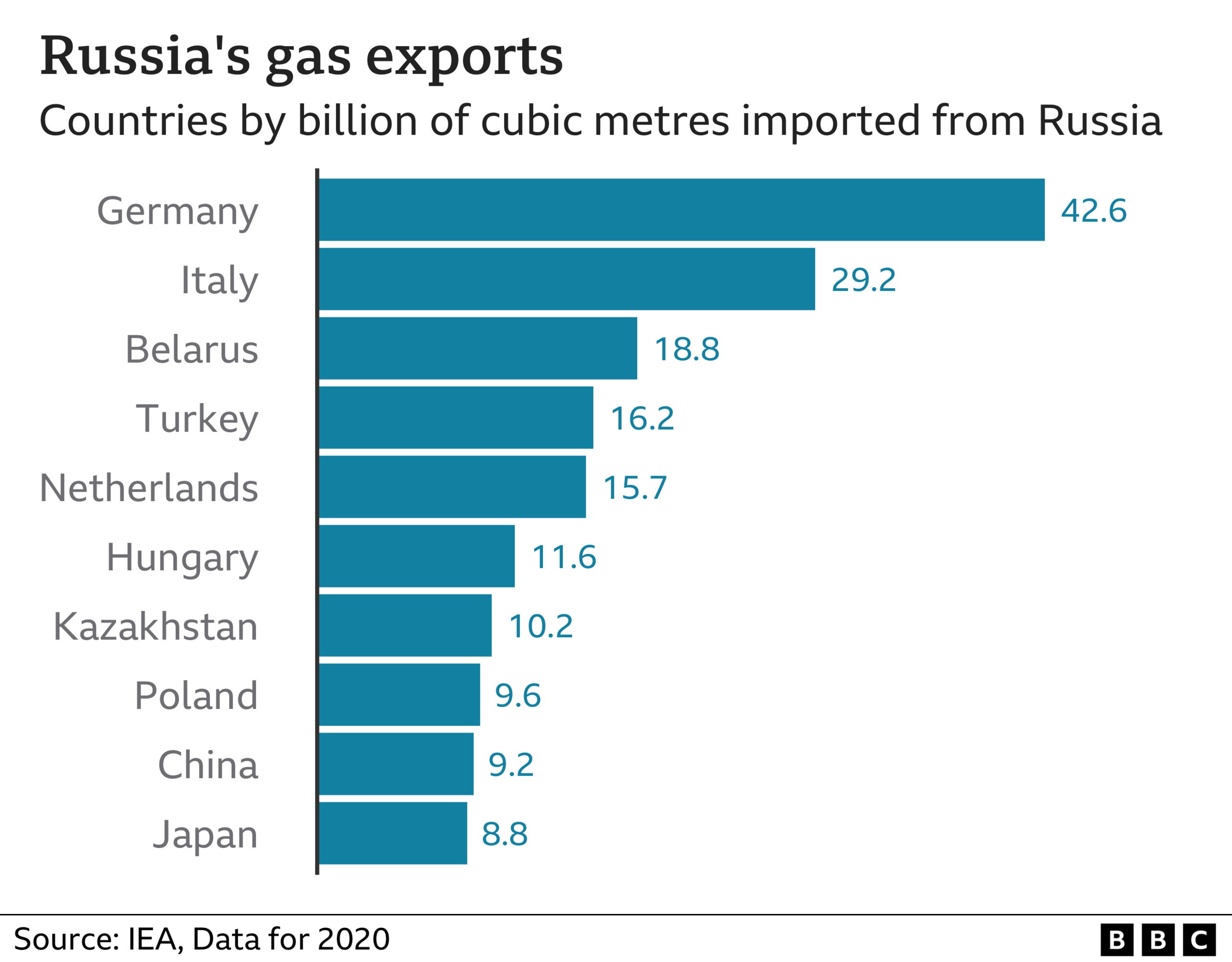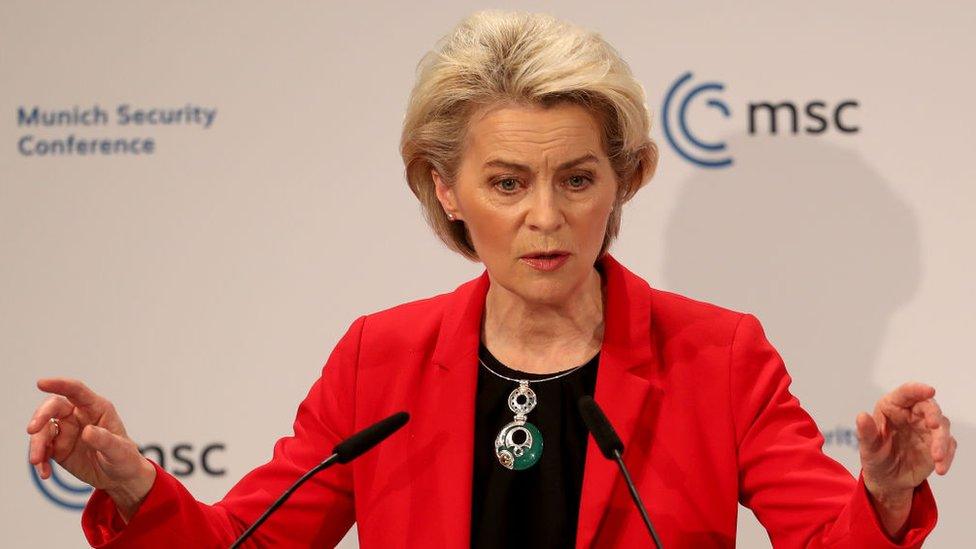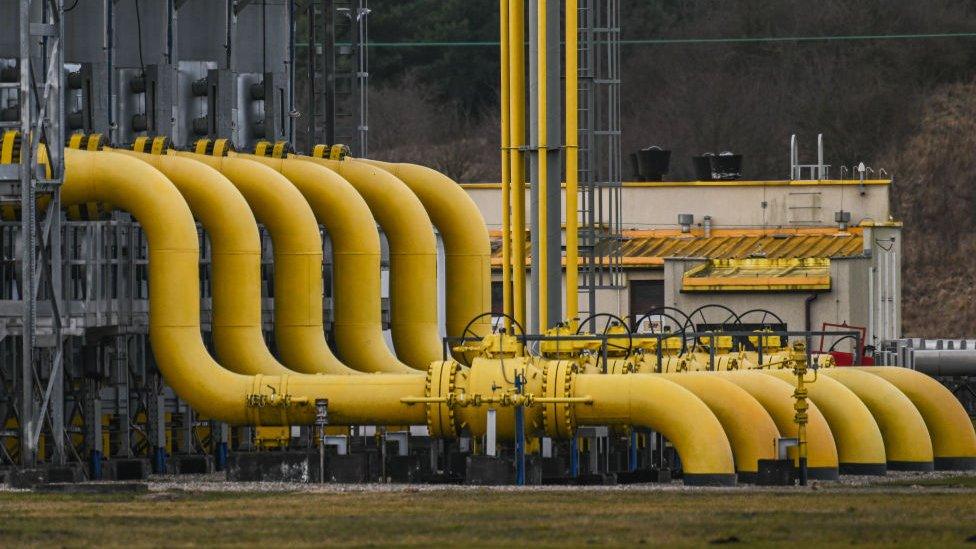German energy firm Uniper ready to meet Russian pay demand
- Published
- comments

One of Germany's biggest energy firms has said it is preparing to buy Russian gas using a payment system that critics say will undermine EU sanctions.
Uniper says it will pay in euros which will be converted into roubles, meeting a Kremlin demand for all transactions to be made in the Russian currency.
Other European energy firms are reportedly preparing to do the same amid concerns about supply cuts.
Uniper said it had no choice but said it was still abiding by EU sanctions.
"We consider a payment conversion compliant with sanctions law and the Russian decree to be possible," a spokesman told the BBC.
"For our company and for Germany as a whole, it is not possible to do without Russian gas in the short term; this would have dramatic consequences for our economy."
Germany's biggest energy supplier RWE declined to comment on how it would pay for Russian gas.
In late March, Russia said "unfriendly countries" would have to start paying for its oil and gas in roubles to prop up its currency after Western allies froze billions of dollars it held in foreign currencies overseas.
Under the decree, European importers must pay euros or dollars into an account at Gazprombank, the Swiss-based trading arm of Gazprom, and then convert this into roubles in a second account in Russia.
The European Commission said last week that if buyers of Russian gas could complete payments in euros and get confirmation of this before any conversion into roubles took place, that would not breach sanctions.
However there are different views among countries on how to interpret its initial guidance, and this week EC boss Ursula von der Leyen sparked confusion when she said firms could still be breaking the rules.
On Thursday, an EU official confirmed that any attempt to convert cash into roubles in Russia would be a "clear circumvention of sanctions" as the transaction would involve Russia's central bank.
"What we cannot accept is that companies are obliged to open a second account and that between the first and second account, the amount in euros is in the full hands of the Russian authorities and the Russian Central Bank, and that the payment is only complete when it is converted into roubles."
On Tuesday, Poland and Bulgaria both refused to pay for gas in roubles leading to Russian state gas firm Gazprom shutting off supplies.
Both countries had already planned not to renew their contracts with Gazprom when they expired later in 2022.
Poland - one of the staunchest advocates of tougher sanctions on Russia - said the EU should penalise countries that used roubles to pay for Russian gas.
Climate minister Anna Moskwa singled out Germany, Hungary and Austria as resisting a gas embargo.
"We are counting on there being consequences for these countries [which pay in roubles] and that as a result they will cease paying in roubles," she said.

The move by Russia - which has not given countries the same deadline to begin paying in roubles - is seen as an attempt to divide Western allies in their response over Ukraine.
The majority - 97% - of EU companies' gas supply contracts with Gazprom stipulate payment in euros or dollars.
Hungary and Slovakia have both said they will use Russia's conversion payment method, while German economy minister Robert Habeck said on Wednesday that it was "the path that the EU marked out for us".
"It's the path that is compatible with sanctions, and as far as I understand the German companies that are doing it this way are in compliance with their contracts," he said. "Most EU countries are taking this approach."
Europe gets about 40% of its natural gas from Russia, but it is much higher for some countries and sudden supply cuts could have a huge economic impact.
"A lot of European companies will say OK, we'll pay into a euro-denominated bank account and there will be a back-to-back trade so they stay within the limits of the EU sanctions," said Nathan Piper, an energy analyst at Investec.
"But there are two sides of this - those firms need to supply gas to consumers and in Germany there is no alternative to supplies of Russian gas right now."
According to the Financial Times, external, Austrian energy giant OMV is also planning to adopt the mechanism while Italy's Eni is considering the move.
Eni declined to comment while OMV denied it was opening a Swiss account with Gazprom. It told the BBC: "We have analysed the Gazprom request about payment methods in light of the EU-sanctions and are now working on a sanctions-compliant solution."
Related topics
- Published28 April 2022

- Published27 April 2022
